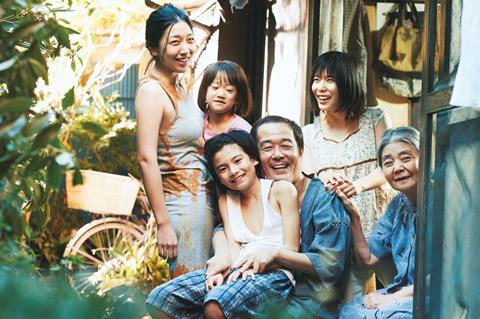
Japanese filmmaker Hirokazu Kore-eda won the Palme d’Or at this year’s Cannes film festival for Shoplifters, his fifth film to be selected for Cannes Competition and his seventh appearance on the Croisette overall as Air Doll (2009) and After The Storm (2016) both played in Un Certain Regard. In 2013, he was awarded the Jury Prize in Cannes for Competition title Like Father, Like Son.
Lily Franky and Ando Sakura head the cast of Shoplifters, as parents of a family living on the fringes of Japanese society, who appear to be happy despite their poverty, but are not all that they seem. Produced by Gaga Corp and Fuji Television Network, the film is being sold internationally by Wild Bunch, while Gaga handles Asian territories. Gaga will also release the film theatrically in Japan in June 2018.
Where did you get the idea for this film?
I wanted to continue with the theme I explored in Like Father, Like Son – what is it that ties families together? Is it blood or the time you spend together? Then a few years ago, there was a story in the Japanese press about pension fraud, where a family after losing their elderly parents didn’t report the deaths and continued to receive their pensions illegally. The class divide has widened in Japan over the past five years, and there are more people who are not being reached by the safety net that should be in place.
As you mentioned, family bonds is a subject you’ve tackled before. Why does it interest you and have you reached any conclusions about what constitutes a family?
I think the more interesting question is where do you find those bonds? And that question is answered in different ways by all the characters in the film. That said though, it is true that blood ties is something that we put a lot of importance on in Japanese society, maybe in Korea too, and that’s one of the reasons why foster care systems have not really evolved in Japan. I wanted to question that by examining different kinds of bonds other than blood.
Does this film feel like a return to the themes of Nobody Knows? [which won Yûya Yagira best actor at Cannes in 2014]
Yes for sure. For about ten years I was consciously taking ideas from things that were happening to me personally – losing my mother, becoming a father myself – and I was telling stories that took place in the apartment blocks where I grew up. But I stopped working that way following After The Storm and decided to take a wider perspective with films that look at modern-day Japanese society. That’s closer to what I was doing in Nobody Knows.
How did you find working with Ando Sakura [Japanese actress known for indie films such as Love Exposure and 100 Yen Love] for the first time?
I still don’t understand all her abilities as an actor, but whenever I was on set, I could just feel how she brought this character, a woman who really wants to be a mother, completely alive. I was moved by her performance and that doesn’t happen every day.
Your last film, crime drama The Third Murder, was a complete departure for you. Do you plan to explore other subjects or return to a family theme for your next film?
There are many subjects I want to work with, including a project about Japan’s role as a perpetrator in World War 2, but it’s difficult for those films to come together. Japanese people want to erase it from their memories, but as a filmmaker I feel I need to tackle this subject, as wonderful directors like Nagisha Oshima and Shohei Imamura have done in the past. However, the family stories, or projects connected to families, seem to come together much more quickly, so that’s where I am right now.

























No comments yet